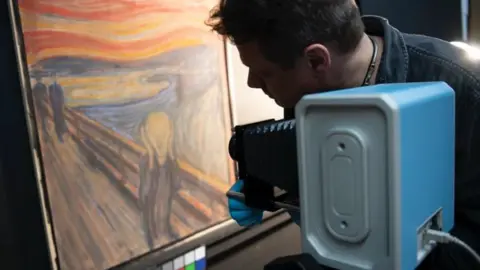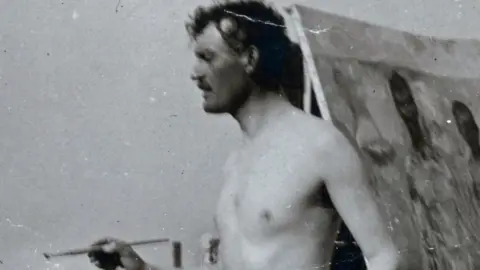Edvard Munch wrote 'madman' graffiti on Scream painting, scans show
 National Museum of Norway
National Museum of NorwayArtist Edvard Munch wrote mysterious graffiti on his painting of The Scream, infrared scans have shown.
A small and barely visible sentence written on one of the world's most well-known paintings has been the cause of much conjecture in the art world.
The words, "Can only have been painted by a madman", are inscribed in pencil in the top left-hand corner.
Now, new tests made by The National Museum of Norway have confirmed they were made by the man himself.
The original painting, first displayed in Munch's home city Oslo (then Kristiania) in 1893, has become a radical and timeless expression of human anxiety. Its influence stretches as far as the 90s Hollywood Scream horror film series, and on to the modern-day emoji.
The artwork has undergone conservation in preparation for its installation in the new museum, which is due to open in the Norwegian capital next year.
Art critics have long questioned whether the graffiti was an act of vandalism done by an outraged spectator, or written by Munch himself - who was known to have had mental health problems throughout his life.
The museum came to the conclusion the words were written by Munch, after using technology to analyse the handwriting and compare it with his own diaries and letters.
 Getty Images
Getty Images"The writing is without a doubt Munch's own," said museum curator Mai Britt Guleng.
"The handwriting itself, as well as events that happened in 1895, when Munch showed the painting in Norway for the first time, all point in the same direction."
In 1994, The Scream was stolen from a Norwegian art museum. It was recovered in a daring undercover operation by British detectives.
'Deep feeling of anxiety'
The work provoked strong criticism at the time along with public speculation around Munch's mental state.
Munch, according to his diaries, was profoundly hurt by the reaction and it's believed he returned to the painting to add his pencilled statement afterwards.
Both Munch's father and sister suffered bouts of depression and Munch was finally hospitalised after a nervous breakdown in 1908.
His mother and older sister both died before the artist turned 14, his father died 12 years later and another sister was admitted to an asylum, with bipolar disorder.
"For as long as I can remember I have suffered from a deep feeling of anxiety which I have tried to express in my art," Munch wrote.
"Without this anxiety and illness I would have been like a ship without a rudder."
In 2019, BBC Arts wrote that the work was "an expression of his anxiety at a turning point in history, in a world increasingly cut loose from old traditions," noting that "there are clear parallels in the world of today.
"This is surely why The Scream retains its power despite its ubiquity: it's a mirror of our own contemporary fears. Inside, aren't we all screaming too?"
The Scream will be displayed with a number of Munch's other works, including Madonna, The Dance of Life and Self-Portrait with Cigarette, in The National Museum of Norway from 2022.

Follow us on Facebook or on Twitter @BBCNewsEnts. If you have a story suggestion email [email protected].
